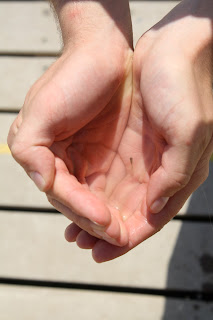The other day I tried to capture the essence of the apartment where Patrick and Aaron live. It is a quirky little place in the center of town, it is the Ethiopian consulate building and they rent out apartments in the building. So many good memories in this apartment! Pictures will follow shortly....
Stepping onto HaNevi’im street, the
ambiance changes. It is a
perceptible change, although you have to be aware in order to notice how the
usual groups of Jews, Arabs, and tourists are now mingled with another
identity; that of the Ethiopians.
Seemingly out of place, they welcome you to their territory, a little
piece of their country in the midst of Jerusalem. You know you’ve reached it when the porcelain lion bearing a
cross, set against a blue background, peers out through the trees and the
gate. Only then do you turn from
the bustling street and step down into unique and diverse world that is the
Ethiopian consulate.
Walking through the door (always
open), “Harry Potter” is the first to greet you. Harry Potter is the Ethiopian man living under the stairs,
with a floral sheet hastily draped up to section off his couch and mattress and
create some semblance of privacy.
Moving past Harry Potter, you turn onto the stairs, but not before
passing the gate into the little courtyard that is a part of someone’s
home. There are often small parties,
20-something year olds sitting around drinking, talking, laughing, and
listening to music coming from the guitar player. Several of the apartment’s windows face into this courtyard,
and as the windows are constantly open, their celebrations and music become
ours to enjoy as well.
Up one flight of stairs, you’ve reached the door of the
apartment, marked by a simple
undecorated dream catcher to ward off evil. If you turn around, you can see the
Ethiopian woman in the apartment next door in her kitchen. She is always there with her pots and
frying pans, seemingly in a perpetual state of cooking. Often the aroma of tonight’s dinner
will fill the stairwell, enticing you to knock on their door and beg to join.
But resisting the temptation, you
finally enter the apartment and first see a long corridor. The walls are painted with block
stripes of red, yellow, and green in honor of the Ethiopian flag, and if this
isn’t clear enough, there is a giant map of Ethiopia plastered on the wall in
front of the lone couch in the apartment.
The five rooms are occupied by American, French, German, and Israeli
tenants, all coming together to share a bathroom and a kitchen. Shelves, tables, and corners also
testify to the cultural diversity of the apartment; they are filled with books
in various languages, languages that go far beyond the current tenants and you
can’t help but wonder how many years ago that book’s owner left it sitting
there.
Various smells greet you as well,
often it is the smoke in the kitchen from the French and Israeli girl’s
cigarettes. There is something
about the creaky doors and tiled floors that draws me back to the apartments in
Italy and I almost expect to turn down the hallway and smell fresh bread from
the bakery downstairs. The black
mold that envelops the bathroom ceiling, the odd assortment of cheap furniture,
and the constant battle to find and destroy mosquitoes buzzing around; I feel
like I could easily be in Sicily or Rome.
But the chatter in Hebrew and the billows of incense pouring through the
open windows from an apartment upstairs remind me of exactly which exotic place
I live in; not Italy but Israel.
Most of all, the rooms contain the
ghosts of the last month. The
Sabbath gourmet meals of eggplant parmesan, stuffed figs, fish, spaghetti, and
sweet potato fries still linger in the kitchen. The mattress on the floor retains the impressions of four
people huddled together singing, sharing life stories, and pouring over scriptures.
The couch in the hallway bears the weight of life’s typical hardships, having
seen the change from light-hearted laughter to the final words of a breakup.
But despite the eccentricity, or maybe in part because of it, this “Ethiopia”
is home, preserving all of the elements of a family and retaining it’s
sacredness because of things experienced, learned, and changed within its
walls.














